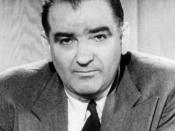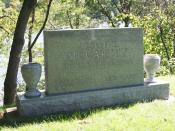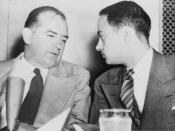A person once said, "Literature opens a dark window on the soul, revealing more about what is bad in human nature then what is good." In other words, authors unlock an evil portal on the spirit and display more about what is regretful in the human race then what is good. This true is because the writer is free to opinionate and write about their intimate emotions that for the most part are unpleasant. John Steinbeck, author of Mice and Men, said, "It is the responsibility of the writer to expose our many grievous fault and failures and to hold up to the light our dark and dangerous dreams, for the purpose of improvement." What he means is that it is the author's mission to reveal our severe mistakes so that eventually we will learn not to make that same errors. I agree with both quotes. In Author Miller's tragedy, The Crucible, and J.
Ronald Oakley's historical essay, "The Great Fear," reveals on how fear can intersect and tear everyone apart.
The theme in The Crucible is that hysteria can tear apart a small village. Hysteria replaces logic and allows people to believe that their neighbors are committing ridiculous and unbelievable crimes like communing with the devil and killing babies. In the play, the townsfolk accept and become active in the hysterical atmosphere not only out of genuine religious piety but also because it gives them a chance to express repressed sentiments and to act on long-held grudges. Throughout the madness, Abigail's motivations were jealousy and a desire to have revenge on Elizabeth Proctor. Abigail takes advantage of the situation and uses it to accuse Elizabeth Proctor of witchcraft and have her sent to jail.
There is little symbolism within The Crucible, but the play can be seen as...



A few questions and comments
I have a few questions and comments about this paper to understand the point.
Who is the originator of the quote that is used as the title, opening line and first line of the conclusion?
Based on the main point, which I assume to be a discussion on how authors are prone to discuss the evils of society more than the good, I am curious about the choice of novels used as a reference point for the essay.
Finally, the conclusion does very little to draw the argument to a close or persuade the audience to agree with the viewpoint of the author.
An okay paper.
5 out of 5 people found this comment useful.